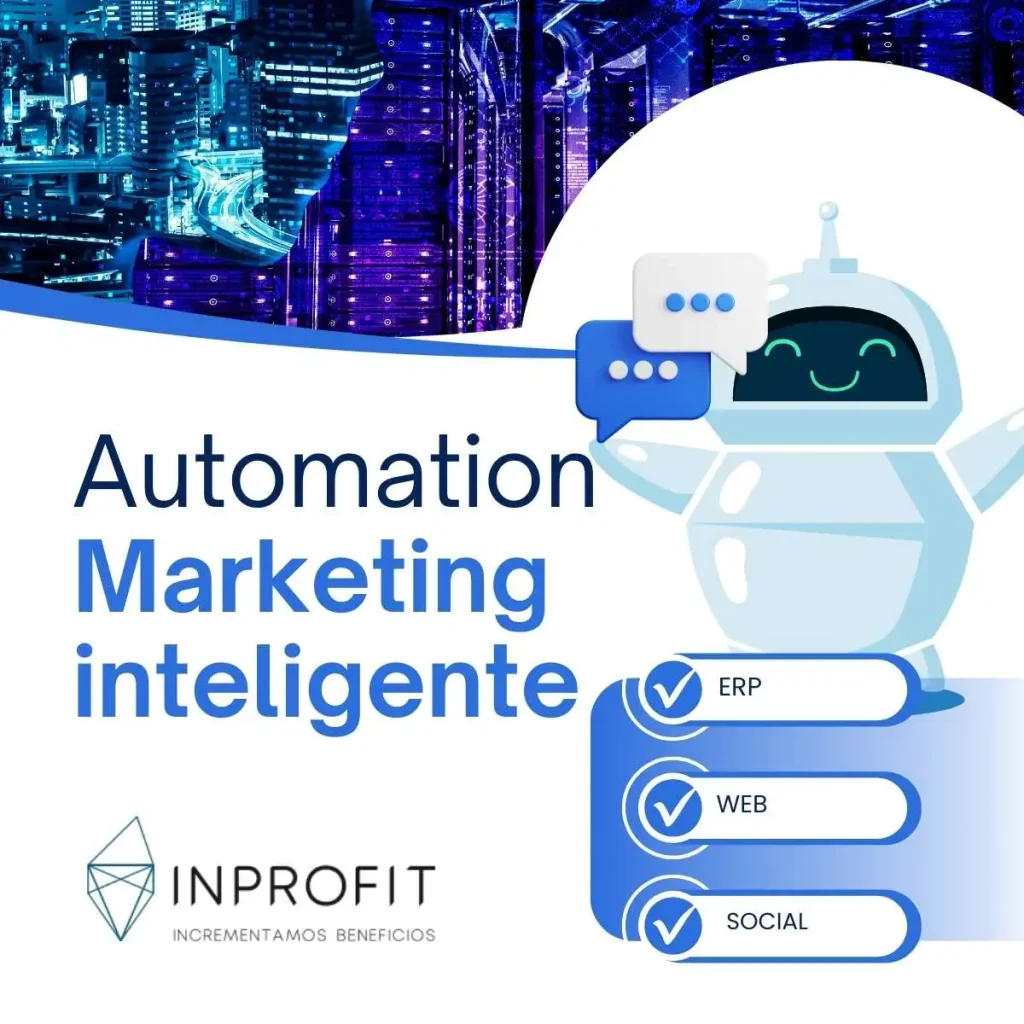In simple terms, marketing automation is the use of software and technological tools to manage, measure and optimize marketing campaigns automatically. This allows companies to interact with their customers without the need for constant manual monitoring.
Why is it so important? Because time and resources are limited. Without automation, companies are forced to perform repetitive tasks manually, reducing productivity and the ability to focus on more creative and profitable strategies.
In a world where customers demand personalized experiences and immediate responses, the most innovative companies are embracing intelligent marketing automation. But what does “intelligent” really mean in this context?
Smart marketing
Intelligent automation goes beyond repetitive tasks; it integrates technologies such as artificial intelligence (AI), machine learning and predictive analytics to anticipate customer needs and deliver solutions before they arise. This approach not only optimizes processes, but redefines the way brands interact with their audience. If your company has not yet explored these possibilities, it’s time to ride the marketing wave of the future.
Intelligent Automation
Intelligent automation is not just about software; it is an ecosystem that combines technology, data and creativity. Unlike traditional solutions, intelligent tools learn from every interaction, continuously improving their effectiveness. For example, platforms like Salesforce Einstein or HubSpot AI use advanced algorithms to predict customer behavior and suggest actions in real time.
This approach allows companies to not only react to customer needs, but to anticipate them. Imagine being able to send a personalized offer just as a customer is about to abandon his or her shopping cart, or recommending a product based on buying patterns that the customer hadn’t even noticed. Intelligent automation turns these ideas into reality.
Hyperpersonalization: The holy grail of CX and UX.
One of the most exciting aspects of intelligent automation is its ability to deliver hyper-personalization. It’s no longer just about including the customer’s name in an email; we’re talking about creating unique experiences based on demographics, past behaviors and individual preferences.
For example, Netflix and Spotify are pioneers in this field, using algorithms to recommend content that keeps users engaged. Companies can apply this same logic to their marketing strategies, offering products, services and messages that resonate deeply with each customer. Hyper-personalization not only increases customer satisfaction, but also drives loyalty and repeat sales.
AI and Machine Learning: The Brain Behind Intelligent Automation
Artificial intelligence and machine learning are the cornerstones of intelligent automation. These technologies enable marketing tools to analyze large volumes of data in real time, identify patterns and make informed decisions.
For example, AI-powered chatbots can resolve customer queries 24 hours a day, while machine learning algorithms optimize ad campaigns based on historical performance.
In addition, these technologies are able to learn and improve over time and connect to the web to extract all the information. The more they are used, the more accurate their predictions and recommendations become. This not only reduces operational costs, but also increases the effectiveness of marketing campaigns.
Predictive strategies
One of the most revolutionary aspects of intelligent automation is its ability to predict customer behavior. By analyzing historical data and current trends, predictive tools can identify opportunities before they materialize.
For example, an online retailer might predict that a customer is about to run out of a product they buy regularly and send them a special offer just in time. This level of anticipation not only improves the customer experience, but also increases sales and reduces the abandonment rate.
Lead Scoring: Prioritizing opportunities with intelligence
Not all leads have the same level of interest in your business. This is where lead scoring comes in, an automation technique that assigns points to prospects based on their behavior and level of interaction with your brand.
If a user has visited several pages on your site, downloaded an ebook or opened several emails, they are likely to be closer to becoming a customer. Thanks to automation, you can set thresholds and configure specific actions for each type of lead, ensuring that the most interested ones receive priority attention.
Intelligent automation in the value chain
Intelligent automation is not limited to the marketing department; it can transform a company’s entire value chain. From inventory management to customer service, these technologies can optimize processes in multiple areas.
For example, in the retail sector, intelligent automation can predict product demand and adjust inventory levels accordingly. In the financial sector, it can analyze spending patterns to offer customized credit products. The key is to integrate these solutions strategically to maximize their impact.
Social Media Automation: Post without being tied to a screen
Managing multiple social networks can be overwhelming, but with automation, you can schedule posts in advance, respond to messages automatically and analyze metrics in real time.
Tools such as Buffer, Hootsuite or Metricool allow you to plan content on different platforms, ensuring a constant presence without the need to manually post every day. In addition, some platforms can automatically respond to certain messages or frequent queries, improving the user experience without requiring immediate intervention.
Chatbots and automated customer service
Chatbots have become a key solution for automating customer service. Not only can they answer frequently asked questions in real time, but they can also direct users to the right information, schedule appointments or even make sales within the chat.
In addition, with artificial intelligence constantly evolving, chatbots can learn from user behavior and provide increasingly accurate and personalized responses, improving customer interaction and reducing the support team’s workload.

Automation in digital advertising
Ad platforms such as Google Ads and Facebook Ads have increasingly incorporated automation options to optimize ad campaigns. From intelligent targeting to automatic budget optimization, automation in digital advertising helps maximize investment and improve results.
For example, Google Ads allows you to set up automated bidding strategies that adjust costs based on real-time ad performance. This means you can spend less money on underperforming impressions and focus your investment on what’s really working.
Challenges and considerations How to get started?
While intelligent automation offers numerous benefits, it also presents challenges. One of the main ones is data privacy. With so much personal information at stake, it is crucial that companies implement robust security measures and comply with regulations such as GDPR.
While automation offers enormous benefits, it is essential to implement it with strategy. It’s not just about scheduling emails or publications, but understanding which processes really need to be automated and how to integrate them with your business strategy.
Some steps to get started include:
- Identify repetitive processes: Which tasks are most time consuming and could benefit from automation?
- Choose the right tools: There are many options on the market such as HubSpot, ActiveCampaign, Zapier or Make.
- Define clear objectives: Automating without a defined purpose can lead to waste of resources.
- Measure and optimize continuously: Automation is not static, it needs constant adjustments and improvements.
The future of marketing is intelligent and adaptive
Intelligent automation is not just a trend; it’s a revolution that is redefining marketing as we know it. By combining advanced technology with customer-centric strategies, companies can create experiences that not only satisfy, but also surprise and delight.
If you have not yet implemented automation strategies in your business, now is the time to start. With the right approach, you can improve efficiency, personalize the customer experience and, most importantly, generate better results without working twice as hard.
Consult now with an Inprofit expert and solve your doubts.




